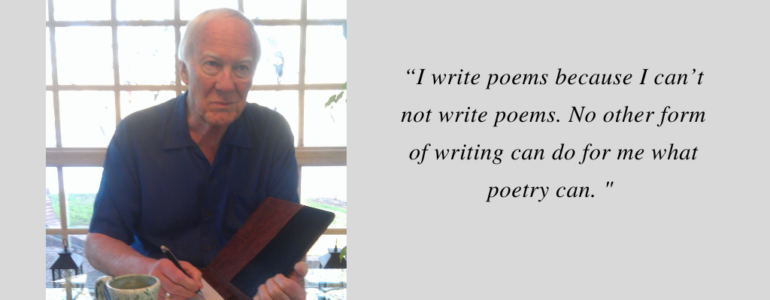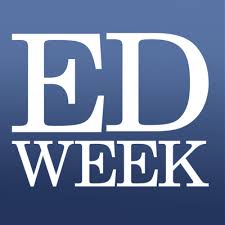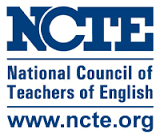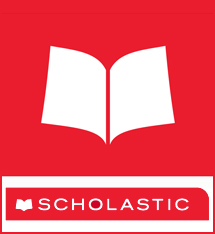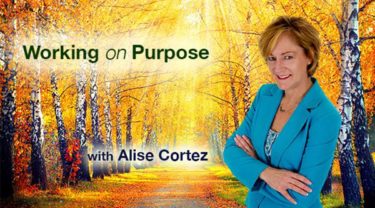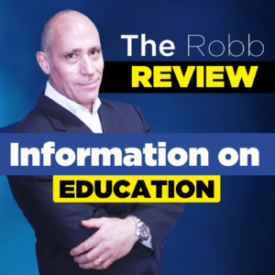By David L. Harrison
I know poets with Ph.D. in front of their names. They lecture about poetry, write books about poetry, and their poems appear in erudite journals and magazines. I know poets who learned their trade by taking classes and workshops, reading poetry, and writing a lot of their own. And I know poets who are tone-deaf, metrically challenged and have little chance of ever being published. But from the amateur to the renowned, all these poets write for the same reason: they love to write poems. There’s another category of poets I know: teachers, who find themselves facing the annual, obligatory poetry unit with the same enthusiasm with which they greet preparing their taxes. It’s one thing to write poems because you want to. Writing them because you have to, especially in front of a classroom of kids watching, can be quite another matter. But it doesn’t have to be, and it shouldn’t be.
When I made up my first poem, I was hungry and tired of waiting. My mother was frying fish in the kitchen and I was sent to the living room to wait for dinner. The words I thought of expressed my need. I liked the way they sounded. “Sometimes I wish/I had a fish/upon a little dish.” No one told me I had to make up a poem. I was six years old so I could do anything. Seven decades later I’m still making up poems. The reason hasn’t changed: it’s a fun thing to do. Writing poems makes me feel good. Writing well is neither simple nor easy but it provides me with a sense of gratification that drives my desire to do it again. I keep paper and pen close by. I stash them in my bedroom, my car, my pockets. If there’s anything I’m better at than finding enticing ideas at unexpected times and places, it’s forgetting them if I don’t quickly scratch out a note.
I write poems because I can’t not write poems. No other form of writing can do for me what poetry can. In a few words I can express my thoughts and feelings about anything that attracts my interest—from wanting a fish upon a dish to the day our daughter was born. This works across the board for everyone from beginner to old pro to teacher showing kids how to do it. What other genre of writing can give us such a range of opportunities?
None.
Unless our ultimate goal is to see our work published, how good we are at writing poems is not as important as the fact that we can write poems. Few people have time or fortitude to tackle a story, much less a novel, but anyone can write a poem and receive the rewards that only true self-expression can provide. Studies show that young people who write poems expand their vocabularies, feel more acutely the natural rhythms flowing through our language, and learn to think more clearly, become more fluent readers and better speakers. Who can say that adults don’t receive similar benefits?
The last few decades have attracted a growing number of poets who specialize in writing for young readers to help entice them to write poems of their own. Many such poems appeal to readers of all ages. Where is the line between “big kids’” poetry and “little kids”’ poetry? For sure some poems meant for adult readers are too dense or sophisticated for young readers. But in many cases, it’s hard to say where or whether a line exists. When children can understand the work of a poet laureate (such as Billy Collins or Ted Kooser) and adults can like poems by “children’s” poets, the issue seems moot. When poems can be shared by so many readers, that alone is worth celebrating.
Where does a love for poetry begin? For many, it starts in kindergarten. Teachers who “marinate” their kids in poetry, as Bernice Cullinan (2006) urges, never wait until their poetry unit rolls around to read a poem to their kids. They do it every day. They know the advantages of involving poetry in every aspect of their teaching. This is not new news. Kathy A. Perfect (1999) wrote, “I could not imagine teaching a day without poetry in my classroom. It starts our day, shapes our day, and sometimes helps us get through the day.” Fast forward to Susan Hutchens (2018, personal correspondence), a Colorado teacher, who urges, “Always make room for poetry with students during times other than the obligatory poetry unit. In fact, be willing to add poetry whenever an interest arises.”
Is so much attention to poetry making a difference among young adults? Sunil Iyengar, NEA director of research and analysis, reported in June, 2018 that “twenty-eight million American adults read poetry this year — the highest percentage of poetry readership in more than 15 years…Young adults and certain racial ethnic groups account for a large portion of the increase. U.S. poetry readers aged 18 to 24 more than doubled…Among people of color, African Americans and Asian Americans are reading poetry at the highest rates — which more than doubled in the last five years.”
When my mother got married as a young woman, she gave up her secretarial job to become a stay-at-home wife and eventually raise two children. One day in her 90s, she casually mentioned to my sister and me that she had been writing poems since before we were born. She produced a shoebox filled with her poems, each handwritten on lined tablet paper. Writing poetry had been her secret delight over a lifetime. Her work wasn’t written to be published. But her love for words and writing made her a perfect coach for a 6-year-old wishing for a fish upon a dish. Not all teachers write better poems than their charges may write one day. That isn’t the point. What matters is that teachers who write poems because they love to are the ones most likely to pass that love along through their kids into the future. What a gift!
© David L. Harrison
Cullinan, E.B. (2006), Galda, L. and Cullinan, E.B. Literature and the child. Harcourt Brace Jovanovich
Hutchens, S. (2018) Personal correspondence. Livermore, CO
Iyengar, S. (2018, June). Reading tends to be a portal to other types of participation and other types of engagement, in the arts and outside the arts. PBS News Hour. Available at https://www.pbs.org/newshour/arts/poetry/how-young-writers-are leading-a-poetry comeback?utm_source=Publishers%20Weekly&utm_campaign=8909d8c26c EMAIL_CAMPAIGN_2018_07_12_09_58&utm_medium=email&utm_term=0_0 b2959cbb-8909d8c26c-305355025
Perfect, K.A. (1999, April). Rhyme and reason: poetry for the heart and head. The Reading Teacher. V. 52, N. 7, P. 728. Newark, DE. International Reading Association. Available at https://www.jstor.org/stable/20204675?seq=1#page_scan_tab_contents.
434 total views , 1 views today

